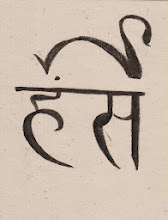A Consideration
As I was considering what I might do to stage Barber's Anthony and Cleopatra, I remembered that New York City Opera put up a version of the work last year, while they were temporarily exiled from their home in Lincoln Center. The company presented the work in concert form, allowing the music to take center stage. Judging from the two reviews I read (here and here), the response to the performance was mixed, but both authors agreed that what was successful about the effort was that the spotlight was focused on Barber's composition and the work was stripped of the competing stage gimmickry that has gone along with it in the past. Perhaps that was just what the piece needed to redeem it. After all, Barber's experimentation with exoticism in the orchestra conjures up almost all of the imagery that an audience needs to appreciate the setting of the opera (I do appreciate the fact, however, that John Yohalem acknowledged in his review that listening to this work takes some concentration).
A Rant
It's just that, in my opinion, an audience's imagination is bound to be much more powerful than anything an opera company can cover the stage with. Why not merely suggest the grandeur of Eygpt and Rome? Why use "six barges, twelve horses, four elephants, and 120 Romans,"* when you could use something simpler and more elegant? Why not let the audience do some of the work and involve them mentally? While I appreciate the sheer grandeur and beauty of many of Zeffirelli's productions on a purely skin-deep level, I think that an opera for which the production values are the main attraction misses the point somehow. Shouldn't opera effect audiences through the drama of the music as well, not just assault them visually? Perhaps that is just my minimalist taste. After all, there is a long tradition of grand opera.... I just think it's somewhat frivolous. On the other hand, if that type of grandeur is a draw for audiences, who am I to say that it is frivolous (I am thinking here of the popularity of Zeffirelli's productions at the Metropolitan Opera, especially his La Bohème)?
A Response
In response to Erin's post The Met Opening - Why Barber?: I think she brings up many good points. I agree that the opening of the new Met should have been an epic event in which the company could show off what it could do. Barring that, when I think "American sound", I hear the compositions of Copland, Gershwin, Bernstein, and even the Barber of "Sure on this Shining Night" or "Knoxville, Summer of 1915". The music that contains that "American" idea is one that has a certain intimacy to it, despite its wide-open-plains feeling. That aesthetic would be easily overshadowed by excessive production values; therefore, in my mind that typically "American" sound and aesthetic simply doesn't seem to mesh with the bombastic staging and sets such as those that Zeffirelli provided for Anthony and Cleopatra. Think of the American opera you know a little about now...Aside from The Ghosts of Versailles (which is based on previously written operatic story lines, and which was criticized for being overly excessive in the same way that Anthony and Cleopatra was), I can't think of any American operas which have the scope or subject matter to support such an ornamental production. Granted, I acknowledge that my knowledge on the subject is still limited. Perhaps this is an idea that will evolve as we continue the class...
*Heyman, “A New Opera House,” Samuel Barber: The Composer and his Music, (New York: Oxford University Press, 1992), 446.
Sunday, February 14, 2010
Subscribe to:
Post Comments (Atom)

No comments:
Post a Comment